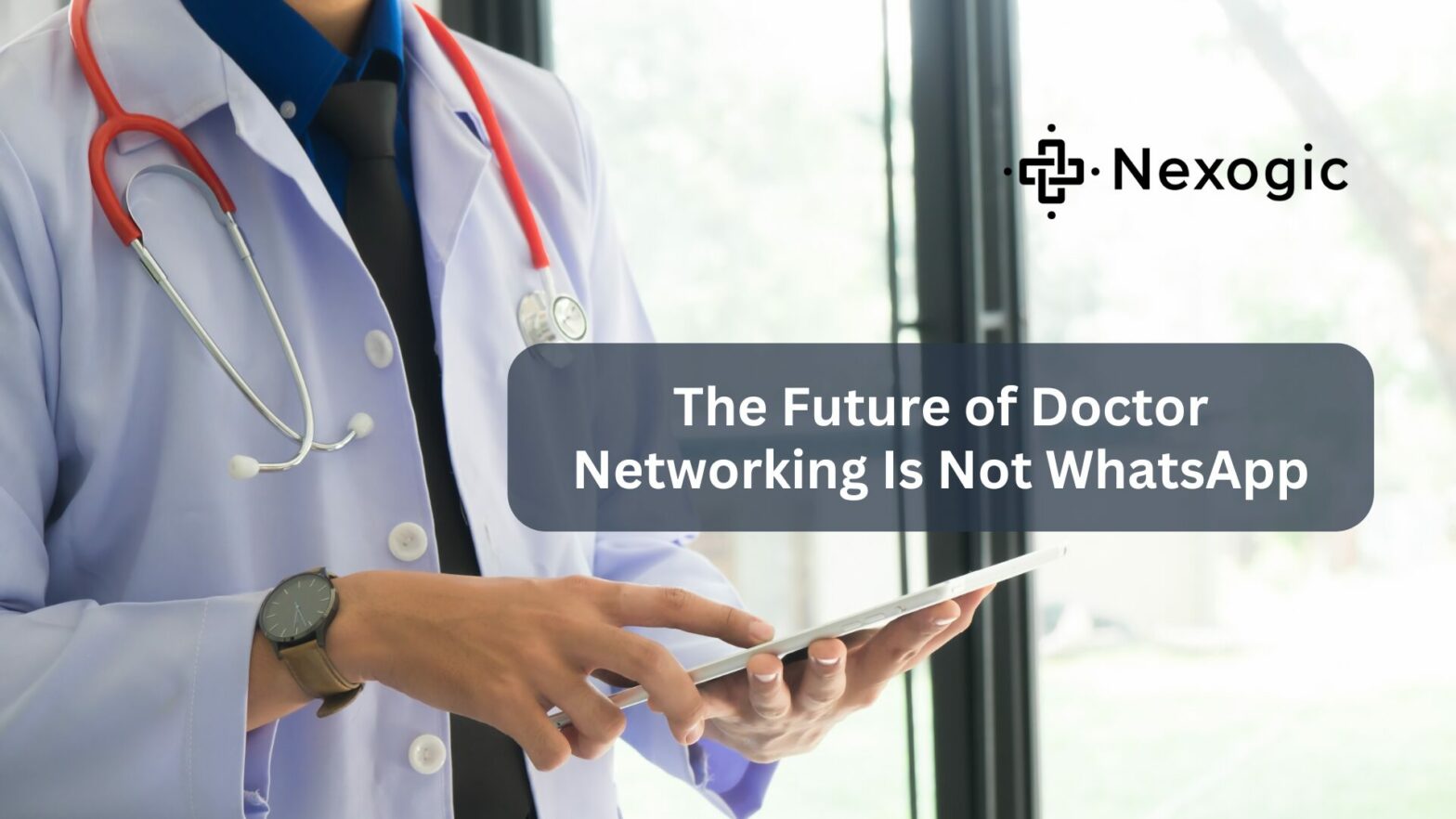The Future of Doctor Networking Is Not WhatsApp
- July 16, 2025
- Nexogic

The Future of Doctor Networking Is Not WhatsApp
As a medical graduate, you’ve likely experienced the “convenience” of WhatsApp. It’s familiar, easy, and often feels like the path of least resistance for quick chats or sharing information.
But, when it comes to professional medical networking and handling patient information, that convenience is a double-edged sword. The truth is, relying on consumer apps for healthcare communication is a practice that needs to evolve.
The WhatsApp Dilemma: Balancing Convenience with Compliance in Healthcare
WhatsApp has transformed its way we communicate with the end users. Its instant messaging, voice notes, and easy media sharing make it incredibly convenient, even in the medical world. Many healthcare professionals naturally turn to WhatsApp to coordinate with colleagues, discuss patient logistics, or stay connected in high-pressure environments.
However, as helpful as it is, WhatsApp wasn’t built with healthcare compliance in mind especially when it comes to handling Protected Health Information (PHI). Here’s what you should consider:
What Works Well
End-to-End Encryption: WhatsApp does a solid job with message encryption during transmission. This means that messages are secure in transit and can’t be intercepted.
Ease of Use: Its simplicity and widespread adoption make it a quick go-to for real-time communication, particularly in emergencies or between teams in different locations.
Where It Falls Short for Healthcare Use
Limited Administrative Controls: WhatsApp doesn’t offer the enterprise-level controls that hospitals or clinics need such as role-based access, audit logs, or centralized account management.
Data Persistence: Media files are often auto-saved to personal devices, and chats are frequently backed up to third-party cloud services like Google Drive or iCloud which may not meet healthcare data protection standards.
Compliance Responsibility: When PHI is exchanged via WhatsApp, the legal and regulatory liability rests with the individual healthcare provider not the platform. This can lead to unintentional breaches and costly consequences.
A Smarter Way Forward
While WhatsApp can still be useful for general coordination or non-clinical discussions, it’s important to pair it with secure, healthcare-compliant platforms when dealing with patient data. Several healthcare-specific communication tools now offer the best of both worlds: convenience and compliance.
Let’s keep the convenience, but add the compliance where it truly matters.
The Rise of Dedicated Platforms: True Collaboration Awaits
The future of doctor networking and secure communication lies in purpose-built, compliant platforms. These aren’t just messaging apps; they are integrated clinical collaboration ecosystems.
Imagine a platform that offers:
- Robust end-to-end encryption for data both in transit and at rest.
- Secure file sharing among the users and Strong authentication
- Comprehensive audit trails and access logs.
- Integration with Electronic Health Record systems.
- Streamlined administrative tasks like appointment management and prescription refills.
- Support for real-time, multi-format communication including text, voice, and video.
These platforms drive better collaboration, leading to enhanced patient care and operational efficiency – a strategic investment
Embrace the Future with Nexogic
Navigating this shift can seem daunting, but it’s a critical step for modern medical professionals.
This is where Nexogic comes in. It is dedicaed to the medical professional and understands challenges and demands in the healthcare sector.
We can guide you through the process of transitioning from insecure consumer apps to robust, compliant, and efficient professional networking and communication platforms.
Nexogic helps you:
- Understand your specific compliance needs: Ensuring you avoid the pitfalls of
non-compliant communication. - Identify the right secure platforms: Tailored to your practice and collaboration
requirements. - Implement and integrate new solutions: Making the transition smooth and effective.
- Maximize the benefits: Helping you unlock true collaboration, enhance patient care, and streamline your operations.
Don’t let outdated communication methods hold back your practice or expose you to unnecessary risks. Embrace the secure and collaborative future of healthcare networking.
Final Words:
WhatsApp isn’t built for modern medical practice. It’s time to move beyond the limits and prioritize compliance, security, and collaboration. Upgrade your professional network – start exploring better platforms, and let Nexogic help you make the switch safely and smartly. Explore it today.


